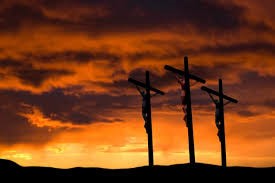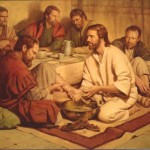Imagine yourself a servant in the mansion of a king. One evening your master leaves to marry. After the wedding he and his bride host a fabulous reception. When he returns, he removes his princely wedding garments and puts on a servant uniform. He gathers the servants at the family table. Then, with the elements from his own wedding feast he serves those who are responsible to serve him.
What would your reaction be? What would you think of the king who served you?
 What sort of king would do such a thing? Or as blogger John Wesley Reed has asked, “What kind of king would step off his throne to die for his people?”
What sort of king would do such a thing? Or as blogger John Wesley Reed has asked, “What kind of king would step off his throne to die for his people?”
Yet this is exactly what Jesus has done!
You may share my experience of seeing something for the first time in a passage of scripture you’ve read for years. This happened to me recently in Luke.
Be dressed ready for service and keep your lamps burning, like servants waiting for their master to return from a wedding banquet, so that when he comes and knocks they can immediately open the door for him. It will be good for those servants whose master finds them watching when he comes. Truly I tell you, he will dress himself to serve, will have them recline at the table and will come and wait on them. It will be good for those servants whose master finds them ready, even if he comes in the middle of the night or toward daybreak. Luke 12:35-38 (NIV)
Over the course of my long life I have read this passage perhaps hundreds of times, but only recently did I notice the phrase “dress himself to serve.” I was surprised to discover these words, but I was not surprised by the action of the master, because of who is telling this story.
The Message paraphrase intimates that the master is the bridegroom returning from the wedding feast.
Keep your shirts on; keep the lights on! Be like house servants waiting for their master to come back from his honeymoon, awake and ready to open the door when he arrives and knocks. Lucky the servants whom the master finds on watch! He’ll put on an apron, sit them at the table, and serve them a meal, sharing his wedding feast with them. It doesn’t matter what time of the night he arrives; they’re awake—and so blessed!
 Like the parable of the Ten Virgins trimming their lamps awaiting the bridegroom (see Matt 25), this parable teaches about the need to be watchful. In this story, the servants of the master are waiting for his return. They must be ready to fulfill their domestic responsibilities to the master for his day’s end.
Like the parable of the Ten Virgins trimming their lamps awaiting the bridegroom (see Matt 25), this parable teaches about the need to be watchful. In this story, the servants of the master are waiting for his return. They must be ready to fulfill their domestic responsibilities to the master for his day’s end.
But the master turns the tables on the servants! Instead of being served, he exchanges his royal clothes for a servant’s garment and then serves his servants as if they were kings. This is the Master Servant, Jesus Christ. This is the great reversal.
American pastor and theologian Warren W. Wiersbe provides additional insights on this passage.
Jewish weddings were held at night, and a bridegroom’s servants would have to wait for their master to come home with his bride. The new husband would certainly not want to be kept waiting at the door with his bride! But the servants had to be sure they were ready to go to work, with their robes tucked under their girdles so they were free to move (see 1 Peter 1:13ff).
The remarkable element in this story is the master serving the servants! In Jewish weddings, the bride was treated like a queen and the groom like a king; no one would expect the king to minister to his staff. But our King will minister to His faithful servants when He greets us at His return, and He will reward us for our faithfulness.
The principle for which this story is an illustration is found in Mark 10:44-45: “And whoever wishes to be first among you shall be slave of all. For even the Son of Man did not come to be served, but to serve, and to give His life a ransom for many.”
I am reminded of a conference in Indonesia where I was privileged to be one of the speakers. During the week, the conference director, without warning, asked all the speakers to come forward and sit on the stage. He placed a bowl, a bar of soap, and a towel in front of each of us. Then he asked for volunteers from the audience to wash our feet. Volunteers stepped forward, and when everyone was in place, the director instructed the speakers to change places with the volunteers. No one was expecting this role reversal! I had the privilege of washing the feet of the man who had intended to wash mine. It was a powerful, unforgettable moment for all of us.
Jesus Christ is the Master Servant
 In reflecting on our passage, how would you expect this story to unfold? The master is at his wedding banquet. His servants are waiting his return so they might serve him. The master returns. The servants then wait on their master, helping him prepare for the night.
In reflecting on our passage, how would you expect this story to unfold? The master is at his wedding banquet. His servants are waiting his return so they might serve him. The master returns. The servants then wait on their master, helping him prepare for the night.
That’s what we expect. We don’t expect the complete role reversal that transpires. The master waits on the servants. He exchanges his wedding garments for an apron and serves his servants his own wedding feast. He is the Master Servant!
This is the character of God. He is the God who serves. In the twenty-third Psalm we read the lovely words that reflect the Father’s nature (which the Son manifested): “You prepare a table before me in the presence of my enemies; You have anointed my head with oil; My cup overflows.”
Note who is it that prepares a table for the meal! God’s nature is to serve.
That’s also the nature of his Son, Jesus Christ:
- Isaiah 42:1: “Here is my servant, whom I uphold, my chosen one in whom I delight; I will put my Spirit on him, and he will bring justice to the nations.”
- Mark 10:45: “Just as the Son of Man did not come to be served, but to serve, and to give his life as a ransom for many.”
 In John 13:1-17, Jesus serves the disciples the last supper. Then he provides the penultimate demonstration (surpassed only by the cross) of his servant nature: he washes the disciple’s feet.
In John 13:1-17, Jesus serves the disciples the last supper. Then he provides the penultimate demonstration (surpassed only by the cross) of his servant nature: he washes the disciple’s feet.
Will the Groom be serving the wedding supper of the lamb? Might it be at the end of time, as we approach the city of God, that the Master Servant will be there to greet us? As he invites us to sit at the banquet table, will he serve us his wedding feast?
As you reflect on the Master Servant, ask God how you might re-enact the great reversal this week. Whom might you serve in a new way? Who is that person you would not normally serve? What might you do this week for them that would manifest the servant heart of the Master? Perhaps it is someone in your work place, or a stranger on the street, or the clerk at the grocery store.
For a an in-depth study of the servant’s heart see the book, Servanthood, the Calling of Every Christian.
- Darrow Miller






